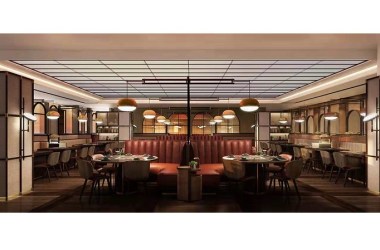A Singapore-based telecom operator has joined forces with Haidilao to pilot a 5G-enabled dining concept at a prominent mall location. The restaurant will showcase robotic service, intelligent kitchen management, and immersive waiting experiences powered by VR and AR, all set within a 5G-enabled environment designed to accelerate customer engagement and redefine dining in high-traffic venues.
Overview of the M1–Haidilao Partnership
The collaboration brings together M1, a major Singaporean telecommunications player, and Haidilao, the globally recognized hot pot brand, to test a next-generation dining model. The concept centers on a newly constructed Haidilao Hot Pot outlet at Marina Square that will be equipped with self-developed smart machines and robotic systems intended to streamline operations and elevate guest interaction. At the heart of the initiative is a customized Intelligent Kitchen Management System (IKMS) designed to optimize workflow, monitor inventory, and coordinate cooking processes with precision. This system is complemented by a tailor-made automatic soup base machine, intended to standardize flavor profiles and ensure consistent quality across every pot prepared.
In addition to the kitchen automation, the restaurant will deploy food delivery robots to enhance in-venue service. A dedicated 5G experience corner will be established to harness M1’s 5G capabilities and Huawei’s technology, creating a testing ground for high-bandwidth, ultra-low-latency applications in a live dining environment. Diners will have the opportunity to engage with instructional, educational, and interactive Virtual Reality (VR) and Augmented Reality (AR) experiences while waiting for the next available seat, transforming the traditional waiting period into an engaging, value-added moment.
Key aspects of the partnership include:
- A self-developed IKMS designed to coordinate kitchen operations and improve throughput.
- A customised automatic soup base machine to standardize flavor production.
- Food delivery robots to support in-store service and reduce wait times.
- A 5G experience corner to showcase immersive VR/AR activities and other 5G-enabled experiences.
- Leveraging Huawei’s technology to enhance network performance, reliability, and security within the dining environment.
This concept represents a strategic foray into the fusion of advanced telecommunications, robotics, and immersive technologies within the food and beverage sector. It also signals an intent to explore how 5G networks can support real-time automation, data-driven decision-making, and interactive customer experiences in a high-demand retail setting. The partnership combines M1’s telecommunications expertise with Haidilao’s brand strength and global restaurant operations knowledge, aiming to deliver a differentiated, technology-forward dining experience that could influence the design of future hospitality spaces.
As part of the rollout, executives from both organizations framed the collaboration as a pioneering step in applying 5G to everyday consumer experiences beyond traditional connectivity use cases. The emphasis is on turning a routine dining wait into an interactive, visually engaging, and informative interlude that educates guests, entertains them, and ultimately enhances satisfaction and loyalty. The collaboration also embodies broader industry trends toward automating front-of-house tasks, improving consistency and safety in food preparation, and enabling seamless integration between kitchen workflows and customer-facing services through high-speed wireless networks.
The Haidilao concept store at Marina Square is positioned as a live lab where operators, technologists, and designers can observe how 5G-enabled robotics, automated cooking equipment, and immersive content affect throughput, guest perception, and operational efficiency. The initiative seeks to quantify improvements in service times, accuracy of kitchen output, and the quality of guest experiences under real-world conditions, while also collecting data to refine models for future deployments in other Haidilao locations and comparable restaurant formats.
Technical Framework: 5G Deployment, Huawei Technology, and Operational Automation
The technical backbone of the Marina Square project rests on a robust 5G infrastructure designed to support high-bandwidth applications with minimal latency. By integrating 5G capabilities with a suite of smart devices and automated systems, the project demonstrates how rapid data transmission, edge processing, and cloud-based analytics can transform restaurant operations. The collaboration leverages Huawei’s technology to maximize network performance, allowing for real-time control of robotic systems, delivery robots, and interactive customer experiences within the dining space.
A core component of the architecture is the Intelligent Kitchen Management System, which coordinates kitchen tasks with precise timing and fault-tolerant control. IKMS enables synchronized operation across multiple stations, ensuring that food preparation, cooking temperatures, portioning, and quality checks occur in a tightly orchestrated sequence. This level of automation reduces variance, increases throughput, and provides a data-rich environment for continuous improvement.
The automated soup base machine represents another critical capability, designed to produce consistent flavor profiles and optimize ingredient usage. Through intelligent dosing, temperature control, and recipe adherence, the system minimizes waste and ensures guests receive consistent results with every visit. The fusion of IKMS and automated base preparation demonstrates how robotics and automation can harmonize with human labor to deliver superior dining experiences.
In addition to in-kitchen automation, delivery robots are deployed to support in-venue service. These robots navigate the dining floor to deliver dishes, utensils, or beverages to tables, freeing staff to focus on guest engagement and complex tasks that require human attention. The use of robotic assistants also enhances safety by reducing contact points and enabling precise, repeatable service interactions. The robots operate within a controlled environment powered by the 5G network, which provides reliable, low-latency connections essential for real-time navigation and task updates.
The 5G experience corner functions as a laboratory for immersive experiences, enabling guests to explore VR and AR content while they wait for seating. The VR/AR experiences are designed to be instructional, educational, and entertaining, offering guests an opportunity to engage with interactive simulations, virtual tours, or gamified learning modules related to food preparation, cultural heritage of cuisine, or even robotics and technology. The corner serves a dual purpose: it entertains guests and generates data that can be used to refine the guest journey, optimize wait times, and tailor marketing approaches to individual preferences.
From a network perspective, the project emphasizes the importance of reliable coverage, low latency, and secure data handling in a busy retail environment. The use of 5G enables high-speed communications between devices, edge servers, and central systems, facilitating coordinated actions across the IKMS, soup base preparation, robots, and customer-facing experiences. The approach also highlights considerations around privacy, data management, and security, given the sensitive nature of order data, kitchen operations, and guest interactions within a public venue.
The Marina Square concept represents a holistic testbed for next-generation hospitality technology. It explores how real-time data, machine learning, and automation can work in concert to improve operational efficiency, service quality, and guest engagement. The findings from this deployment could inform subsequent scale-up strategies, including potential expansion to additional Haidilao locations or other brands seeking to integrate 5G-enabled robotics and immersive experiences in their outlets. The project thus stands at the intersection of hospitality, telecommunications, and immersive media, illustrating a practical pathway for 5G adoption in everyday consumer settings.
Customer Experience: Immersive VR/AR and Smart Waiting
A central pillar of the Marina Square initiative is transforming the waiting experience into an engaging, educational, and entertaining journey. Guests will have access to instructional and interactive VR and AR experiences that occupy the 5G experience corner. These experiences are designed not only to amuse but also to enhance guests’ understanding of the dining process, culinary techniques, and the technology that supports the service they receive.
The VR/AR content may include guided tours of Haidilao’s kitchen workflow, explanations of how IKMS coordinates cooking steps, and demonstrations of how soup bases are developed. Educational modules could cover topics such as the science of heat transfer in cooking, the importance of ingredient quality, and the role of precise temperature control in achieving flavor consistency. By delivering these experiences through 5G-enabled devices, guests can enjoy high-quality visuals, responsive interactions, and immersive storytelling without compromising the overall dining timeline.
From a guest experience perspective, the combination of a dedicated waiting area with VR/AR content and autonomous service elements can reduce perceived wait times. When guests are engaged in meaningful activities during what would otherwise be idle time, they are more likely to have a positive perception of the entire dining journey. The immersive components also offer opportunities to collect guest feedback, preferences, and behavioral data in a privacy-conscious way, enabling operators to tailor future experiences and refine service design for higher satisfaction.
The VR/AR experiences are complemented by on-site demonstrations of robotic assistants and automated systems. Seeing machines in action—such as the IKMS coordinating cooks, or robots retrieving dishes from storage and delivering items to tables—provides tangible evidence of technology integration in hospitality. For many guests, witnessing automation firsthand can reinforce perceptions of quality, safety, and efficiency, while also sparking curiosity about how such systems function.
The guest journey at the Marina Square location is designed to be layered and progressive. Early-stage interactions focus on education and entertainment within the VR/AR environment. As guests proceed through the dining process, they experience the practical benefits of automation—the precision of cooking, the speed of service, and the consistency of taste—before finally enjoying a meal that has been prepared and delivered within a seamlessly orchestrated workflow. The end-to-end experience aims to demonstrate how 5G-enabled robotics and intelligent systems can harmonize with human expertise to create a superior dining encounter.
Strategic Objectives for Haidilao and M1
For Haidilao, the initiative aligns with a broad strategy to reinforce its reputation as an innovator in the hospitality sector, expanding the brand’s appeal beyond conventional dining experiences. The trial at Marina Square serves as a proving ground for how Haidilao can incorporate cutting-edge technology into guest interactions, operational optimization, and brand storytelling. The emphasis is on delivering a premium, frictionless experience that resonates with contemporary consumers who seek both exceptional food and engaging technologies. By partnering with M1 and leveraging 5G capabilities, Haidilao aims to set a benchmark for how hospitality can be enhanced through digital innovation while maintaining the high standards of service that the brand is known for globally.
From M1’s standpoint, the collaboration represents a strategic extension of its 5G leadership into consumer-facing industries and multi-sensory experiences. The initiative demonstrates how 5G networks can support real-world applications in retail and hospitality, beyond conventional communications use cases. M1 views the Haidilao project as a flagship deployment that could inform future partnerships with other brands in the F&B and retail spaces. The project underscores M1’s commitment to showcasing the practical benefits of 5G, including enhanced customer engagement, improved operational efficiency, and the potential for new revenue streams derived from advanced services and data-driven insights.
The statements from leadership emphasized the alignment of 5G capabilities with tangible business outcomes. A senior executive highlighted the opportunity to bring a smart, immersive dining experience to life through collaboration with a globally recognized brand, signaling a belief that technology can complement human expertise to deliver superior service. The Haidilao leadership also underscored the importance of guest experience, noting that 5G-enabled experiences can elevate brand perception, increase dwell time in-store, and drive customer loyalty. This partnership is presented as a mutual venture designed to learn, iterate, and scale, with lessons that could inform broader deployment strategies across Singapore and potentially beyond.
The strategic objectives also contemplate the broader implications for the 5G ecosystem in Singapore. By integrating advanced robotics, automation, and immersive media into a high-traffic restaurant environment, the project could catalyze interest from other retailers, hospitality operators, and technology providers seeking to explore similar approaches. The collaborative model demonstrates how cross-industry partnerships can accelerate innovation, reduce time-to-market for new capabilities, and validate the practicality of 5G-powered transformations in real-world settings.
The Marina Square Restaurant Concept: Layout, Operations, and Experience
The Haidilao restaurant at Marina Square is designed as a modern, technology-forward space that integrates dining with automation and experiential elements. The layout is configured to support the smooth flow of guests from entry to seating, with dedicated zones for kitchen automation, robotic service, and immersive waiting experiences. The operational philosophy centers on aligning technology-enabled efficiency with guest-centric service excellence, ensuring that automation enhances rather than detracts from the personal touch Haidilao is known for.
Key architectural and operational considerations include:
- A clearly defined 5G experience corner that hosts VR/AR activities, demonstrations, and interactive content.
- An IKMS-driven kitchen environment where cooks and automated systems coordinate to produce consistent results.
- A dedicated area where delivery robots and staff collaborate to manage orders, table service, and replenishment needs.
- An aesthetic and acoustic design that balances high-tech features with the warmth and hospitality expected in Haidilao venues.
The concept emphasizes flexibility, allowing operators to adjust the intensity and mix of technology-driven features based on guest feedback and operational data. By monitoring guest engagement in real time and analyzing service metrics, the restaurant can fine-tune the balance between automation and human interaction to maximize satisfaction and throughput. The approach also contemplates scalability, considering how similar configurations could be replicated across other Haidilao locations or adapted for different cuisines and service models.
From the guest perspective, the experience begins with clear introductions to the 5G-enabled features through signage, staff guidance, and on-site demos. Guests are invited to participate in VR/AR sessions, learn about the intelligent tools supporting their dining, and observe automated systems in action. The experience is designed to be informative without being intimidating, reinforcing the message that technology serves to enhance hospitality rather than replace it. The objective is to create a memorable, education-rich visit that reinforces Haidilao’s commitment to innovation and quality.
The Marina Square site also serves as a laboratory for data-driven improvement. By capturing guest interactions with the IKMS, robots, and VR/AR experiences, operators can gain insights into service pain points, preferred dining modes, and the impact of waiting-time entertainment on overall perceptions. Data governance and privacy considerations are addressed through thoughtful design of data capture, anonymization, and secure handling practices, ensuring guest trust remains a priority in the deployment of these advanced technologies.
Implications for Singapore’s 5G Ecosystem and Retail Innovation
The partnership illustrates how 5G can act as an enabler for immersive hospitality experiences and automated service in high-footfall environments. By combining high-speed connectivity with intelligent automation and rich media experiences, the Marina Square project demonstrates a pathway for retailers and food service operators to differentiate themselves through technology-driven value propositions. For Singapore’s broader 5G ecosystem, the project provides a concrete example of how operators can translate network capabilities into tangible consumer benefits, encouraging other businesses to explore similar combinations of robotics, automations, and immersive content in their own spaces.
Moreover, the project aligns with ongoing industry trends toward experiential retail and “phygital” experiences, where physical spaces are augmented by digital technologies to create compelling, shareable guest experiences. The use of VR and AR in a dining context represents a novel integration of entertainment, education, and hospitality, potentially driving longer dwell times, higher customer satisfaction, and increased repeat visits. Operators contemplating 5G adoption in the retail and hospitality sectors can draw practical lessons from the Marina Square model, including the importance of a cohesive technology stack, user-friendly interfaces, and a staged approach that prioritizes guest comfort and safety.
From a technology perspective, the Marina Square deployment highlights the importance of edge computing, device interoperability, and a resilient network design. To successfully deliver these experiences at scale, operators must consider factors such as network planning for dense environments, interference management, device security, and the user experience lifecycle—from onboarding to ongoing engagement. The initiative also underscores the potential for new service lines, such as data-driven guest engagement analytics, personalized dining experiences, and performance-based service metrics informed by real-time data streams.
In terms of business impact, the concept aims to deliver measurable improvements in operational efficiency, guest satisfaction, and brand differentiation. While the exact economics would depend on deployment scale, guest uptake, and the efficiency gains realized through automation, the Marina Square project points to a future where 5G-enabled automation helps hospitality operators manage higher volumes with improved consistency and faster service. The collaboration may also inform policy discussions about data privacy, security standards for robotic systems, and the regulatory frameworks that guide the deployment of advanced technologies in public dining spaces.
About M1 and Haidilao: Corporate Profiles and Strategic Context
M1, a subsidiary of Keppel Corporation, is recognized as Singapore’s dynamic communications company, delivering mobile and fixed services to a large customer base. Since launching commercial services in 1997, M1 has achieved several industry firsts, including early nationwide 4G coverage and the deployment of high-speed fixed broadband. The company has consistently prioritized network quality, customer service, value, and innovation, operating with a mission to connect people and devices anytime, anywhere. In this project, M1 extends its 5G leadership into a tangible, consumer-facing application, leveraging its capabilities to support real-world business outcomes across the hospitality and retail sectors.
Haidilao, established in 1994, has grown into a globally recognized brand in the catering and hospitality sector. The group’s network spans multiple continents, with hundreds of directly operated restaurants across various markets, including mainland China, Hong Kong, Taiwan, Singapore, the United States, Japan, South Korea, Canada, the United Kingdom, Vietnam, Malaysia, Australia, and beyond. Haidilao is known for its emphasis on high-quality service, personalized customer experiences, and a strong commitment to innovation. The Marina Square initiative aligns with Haidilao’s ongoing strategy to explore new service paradigms that combine food excellence with technology-enabled guest engagement, testing new concepts that could inform future store formats and service models across its global footprint.
Operational Insights, Guest Feedback, and Future Prospects
As a live testing ground, the Marina Square project is designed to capture a wide range of operational and guest experience data. The feedback loop is intended to inform iterative improvements, enabling both M1 and Haidilao to refine the technology stack, the layout, and the service flow. By focusing on lessons learned from 5G-enabled automation and immersive experiences in a hospitality setting, the collaboration seeks to create a scalable blueprint that can be applied to other restaurant concepts seeking to blend digital and physical guest journeys.
From a market perspective, the Marina Square initiative positions 5G as a practical tool for transforming guest experiences in the food service industry. The deployment demonstrates how high-speed networks can support real-time automation, edge processing, and interactive media in settings characterized by high guest turnover and complex service workflows. This approach has the potential to set new expectations among diners regarding the role of technology in hospitality, encouraging brands to invest in robotics, intelligent kitchen systems, and immersive content that complements traditional cuisine and service standards.
Operationally, the project emphasizes the importance of cross-functional collaboration between technology providers, telecommunications operators, and hospitality brands. Successful execution requires alignment across network engineering, software development, robotics integration, culinary operations, and front-of-house service. The Marina Square concept serves as a case study in how to orchestrate such multi-disciplinary collaboration to achieve a cohesive guest experience that is both technically sophisticated and warmly human.
Looking ahead, the partnership may inform broader conversations around 5G adoption in retail and hospitality in Singapore and beyond. If the model proves effective, Haidilao and M1 could explore expanding the concept to additional locations or adapting the approach to other brands seeking to differentiate through immersive experiences and automation. The potential for scalable impact hinges on continued innovation, rigorous data governance, and the ability to translate laboratory concepts into reliable, cost-effective, and scalable store configurations.
Practical Considerations: Customer Privacy, Security, and Human-Centric Service
As with any deployment that integrates automation, data collection, and immersive media, the Marina Square project must address privacy, security, and user trust. While the primary content highlights the benefits of 5G-enabled experiences and robotic services, responsible implementation requires transparent policies regarding data handling, consent, and the secure operation of connected devices. Guests should have confidence that personal information gathered during interactions or VR/AR experiences is managed in a privacy-conscious and compliant manner, with clear options to opt out of data collection where feasible.
Security considerations are equally critical. The integration of multiple connected devices, automated systems, and edge computing components necessitates robust cybersecurity measures to protect guest information, prevent unauthorized access to kitchen equipment, and guard against disruption to service. A defense-in-depth strategy, regular security assessments, and adherence to industry best practices are essential to maintaining trust and ensuring operational resilience in a live dining environment.
From a human-centric perspective, the project emphasizes balancing automation with the human touch that defines Haidilao’s core brand. While robots and automated systems can drive efficiency and consistency, trained staff remain essential for guest interaction, problem resolution, and personalized service. The design philosophy should ensure that automation supports staff rather than replaces them, enabling team members to focus on higher-value tasks such as guest engagement, culinary artistry, and relationship-building with customers. The ultimate objective is to use technology to amplify hospitality quality and to create a compelling, human-centered dining experience that resonates with diverse guest demographics.
Cost considerations also come into play when evaluating all these technologies. While automation and immersive experiences can drive long-term benefits through improved throughput and guest satisfaction, they require upfront investment, ongoing maintenance, and careful lifecycle management. Operators exploring similar implementations should conduct thorough cost-benefit analyses, including total cost of ownership, maintenance commitments for robotics and software, energy considerations, and potential productivity gains. The Marina Square concept offers a valuable reference point for how to structure such investments in a way that aligns with brand strategy, guest expectations, and operational realities.
Conclusion
The M1–Haidilao initiative at Marina Square embodies a forward-looking approach to hospitality, where 5G connectivity, automation, and immersive media converge to reshape dining experiences. By introducing intelligent kitchen management, automated soup base production, service robots, and a dedicated 5G experience corner, the project aims to deliver faster service, consistent culinary quality, and engaging guest interactions that extend beyond the traditional dining model. The collaboration with Huawei technology highlights the emphasis on high-performance network support, enabling real-time coordination and immersive content with reliability and security.
This concept store represents more than a single storefront—it signals a strategic experimentation platform for 5G-enabled hospitality innovations. The lessons learned from this trial could inform wider adoption of robotic assistance, automated kitchen systems, and VR/AR-driven guest engagement across the hospitality and retail sectors. Through its dual focus on operational excellence and enriched guest experiences, the Marina Square project aspires to set a benchmark for future smart dining concepts, influencing how brands integrate technology into hospitality, how operators design service pathways, and how consumers perceive the role of 5G in everyday life.
In summary, the collaboration showcases a tangible vision of the future of dining, where technology and human hospitality work in tandem to deliver memorable experiences. The marina-square concept stands as a landmark case in the ongoing evolution of 5G-enabled, experience-rich hospitality that could reshape visitor expectations and industry standards for years to come.



